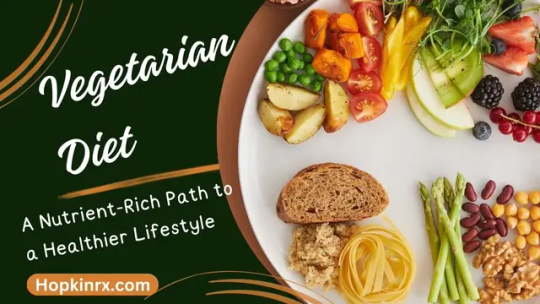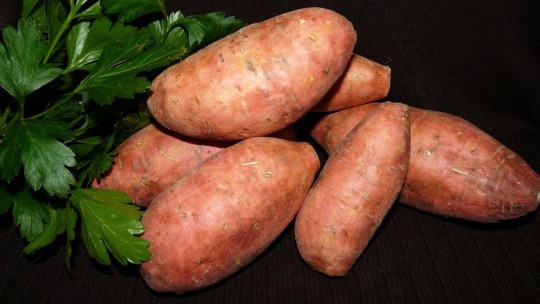#Flexitarian diet
Explore tagged Tumblr posts
Text
Excerpt from this story from Grist:
A new report finds that the United States could more efficiently produce food if half the country’s protein supply came from plant-based or alternative proteins rather than meat or dairy.
The analysis demonstrates how a shift toward a plant-based diet provides ample benefits for the environment and the climate. In its latest report, the Good Food Institute, or GFI — a nonprofit think tank that supports the growth of alternative proteins — calculates that if Americans replaced 50 percent of their animal protein consumption with plant-based options, then 47.3 million fewer acres of cropland would be needed to grow the same amount of protein.
That land, which altogether makes up an area roughly the size of South Dakota, represents tremendous opportunities for carbon sequestration and biodiversity, according to GFI. The organization argues that if those acres weren’t used to grow crops, they could instead be transformed into carbon sinks or used to restore threatened ecosystems. That would deliver climate benefits on top of the reduction of animal agriculture’s more direct emissions sources: manure and cow burps.
The U.S. currently devotes a tremendous amount of land to agriculture: Over 60 percent of land in the contiguous U.S. is used for agriculture, and 21 percent of that is cropland. A majority of the nation’s cropland — 78 percent — is used to raise crops that are primarily used to feed animals.
The shift toward increased alternative protein production detailed in the GFI report would not require growing more plants. Instead, the U.S. could meet its current protein demand by growing fewer crops overall, and ensuring that more of the commodity crops we already produce — such as soy, grain, corn, barley, oats, and sorghum — are grown for human consumption.
“I think a lot of people, when they hear about plant-based diets, they’re like, ‘That’s going to take so much soy,’” said Priera Panescu Scott, GFI’s lead plant-based scientist, whose background is in material and agricultural science. But Panescu Scott, who co-authored the report, points out that soy is mostly grown to feed livestock, not humans. Worldwide, a majority of soy is used for animal feed, while only 7 percent winds up becoming tofu, tempeh, soy milk, or other foods.
17 notes
·
View notes
Text
Is your current diet failing you? 😔 Learn why the Mediterranean Diet is different. 😉
Follow for more!
#mediterranean#mediterrenian#healthylifestyle#healthy women#daily routine#keto diet#healthy diet#weight loss diet#diet#flexitarian diet#weight loss journey#weight loss#fat loss
0 notes
Text
Eating for the Win: The Best Diets for Serious Runners
Eating for the Win: The Best Diets for Serious Runners #Fitness #Runners #Diet #Marathon #RunnersDiet #IntermittentFasting #KetoDiet #flexitariandiet #glutenfree #paleodiet #DASHDiet #PlantBasedDiet #Nutrition #MacroNutrients #MicroNutrients
As a runner, you know that proper nutrition plays a crucial role in your performance, energy levels, and overall health. But with so many diets out there, it can be overwhelming to determine which one is best for you. In this comprehensive guide, we will explore the top 10 diets for runners, providing you with all the information you need to make an informed decision about your dietary…

View On WordPress
#Carb cycling for runners#Customizing runner&039;s diet#DASH diet#Flexitarian diet#Gluten-free diet#Gluten-free diet for runners#Intermittent fasting#Keto diet for runners#Ketogenic diet#Macronutrients#Mediterranean Diet#Paleo diet#Plant-based diet#Vegan diet for runners#Vegetarian diet for runners#What food makes you run faster?#What&039;s the Best Diet for Runners?
0 notes
Text
Vegetarian Diet: A Nutrient-Rich Path to a Healthier Lifestyle
Vegetarian Diet: A Nutrient-Rich Path to a Healthier LifestyleIntroductionTypes of Vegetarian Diets Lacto-ovo vegetarian Vegan Pescatarian FlexitarianNutritional Benefits of a Vegetarian Diet Abundance of Vitamins and Minerals High Fiber Content Healthy Fats and ProteinsImproved Weight Management with Vegetarianism Plant-Based Foods and Weight Loss Balanced Calorie Intake and Portion…

View On WordPress
#Balanced vegetarian diet#Dairy-free alternatives#Ethical vegetarianism#Flexitarian diet#Green eating#Healthy vegetarian recipes#Meat substitutes#Meat-free diet#Meatless eating#Nutritional vegetarian meals#Plant-based diet#Plant-focused diet#Plant-powered nutrition#Sustainable eating#Veganism#Vegetarian cooking tips#Vegetarian food choices#Vegetarian lifestyle#Vegetarian meal planning#Vegetarian nutrition#Vegetarian protein sources#Vegetarian weight loss#Vegetarianism benefits#Veggie-based dishes#Whole-foods plant-based
0 notes
Text
Transform Your Heart Health with These Top-Ranked Diets
The American Heart Association (AHA) has released its annual list of the best diets for heart health, and the Mediterranean Diet has taken the top spot for the fourth year in a row. The diet, which emphasizes whole foods, including fruits, vegetables, whole grains, lean protein, and healthy fats, has been shown to reduce the risk of heart disease, stroke, and other chronic illnesses. The AHA…

View On WordPress
#American Heart Association#chronic illnesses#DASH diet#Flexitarian diet#fruits#healthy eating#healthy fats#healthy weight#heart disease#heart health#lean protein#lifestyle changes#Mediterranean diet#physical activity#reduce risk#strength training#stroke#vegetables#whole foods#whole grains
1 note
·
View note
Text
My little vegetarian corner
~Food inspos~
Join the community<3

What I order at a restaurant as a vegetarian
Bulgur and chickpea bowl
Vegan sandwich
Bulgur, veggies and salad
Divider by fairytopea
#vegan#vegetarian#vegan community#vegetarian recipes#vegetarianism#veganism#stop animal cruelty#vegan recipes#vegan food#vegetarian food#vegetarian diet#food#recipes#flexitarian
8 notes
·
View notes
Text
Unlock health with the flexitarian diet. Find tips, recipes, and benefits to boost your well-being. Join the movement now!
#Flexitarian#Diet#HealthyEating#PlantBased#BalancedDiet#SustainableEating#EatMorePlants#FlexitarianLifestyle#MindfulEating#Nutrition#WholeFoods#Foodie#HealthyChoices#MealPrep#DietaryDiversity#weightlossjourney#cleaneating#wellness#wellnessjourney#healthylifestyle#youtube#healthyliving#guthealth
6 notes
·
View notes
Text
Switching To A Plant Based Diet Day 10
No, you didn’t miss any posts. I have been focusing on getting my videos up on TikTok and YouTube, and I haven’t posted them here. I think I am only going to post the videos here when I have something to add to the message of the video. Today is a perfect example. I wanted to explain some of the vegetables I am enjoying and why I chose to eat them. The first vegetable I’m going to talk about is…

View On WordPress
#ChooseLove#coaching#confidence#diet#gratitude#Journey#keephammering#losingweight#my600lblife#selfimprovement#Success#weightloss#Branding#chia seeds#eating right#flexitarian#healthy eating#healthy eats#healthy foods#keep hammering#losing weight#meditation#Motivation#my 600 pound life#Obesity#plant based#Positive#Positivity#self improvement#Shameless self promotion
3 notes
·
View notes
Text
FLEXITARIAN DIET PROS AND CONS FOR FITNESS ENTHUSIASTS
In this article, we’ll explore the Flexitarian Diet pros and cons, helping you understand how this flexible eating plan can fit into your fitness journey.
In the realm of modern fitness trends, the flexitarian diet has emerged as a popular choice for individuals seeking a balanced approach to nutrition. Unlike strict vegetarian or vegan diets, the flexitarian diet offers flexibility by primarily focusing on plant-based foods while occasionally incorporating meat and other animal products. This dietary approach is not just a temporary fad but rather a sustainable lifestyle choice embraced by many fitness enthusiasts and health-conscious individuals alike.
1 note
·
View note
Text
Mastering Weight Loss Without Sacrificing Productivity: 10 Practical Tips for Busy Professionals
Read it:
#diet#exercise#flexibility#HealthyEating#FitnessGoals#NutritionTips#WellnessJourney#WeightLoss#CleanEating#HealthyLifestyle#FitLife#MealPrep#GymMotivation#ProteinDiet#LowCarb#VeganLife#PlantBased#WorkoutWednesday#MealPlanning#FoodForFuel#FitForLife#HealthyDinner#Flexitarian#MindBodySoul#HealthyLiving#FitFood#NutritionEducation#HealthMatters#VeganFuel#StayActive
1 note
·
View note
Text
"A global shift to a mostly plant-based “flexitarian” diet could reduce greenhouse gas emissions and help restrict global heating to 1.5C, a new study shows.
Previous research has warned how emissions from food alone at current rates will propel the world past this key international target.
But the new research, published in the Science Advances journal, shows how that could be prevented by widespread adoption of a flexitarian diet based around reducing meat consumption and adding more plant-based food.
“A shift toward healthy diets would not only benefit the people, the land and food systems,” said Florian Humpenöder, a study author and senior scientist at the Potsdam Institute for Climate Impact Research, “but also would have an impact on the total economy in terms of how fast emissions need to be reduced.” ...
The researchers found that adopting a flexitarian diet could lower methane and nitrous oxide emissions from agriculture and lower the impacts of food production on water, nitrogen and biodiversity. This in turn could reduce the economic costs related to human health and ecosystem degradation and cut GHG emissions pricing, or what it costs to mitigate carbon, by 43% in 2050.
The dietary shift models also show limiting peak warming to about 1.5C can be achieved by 2045 with less carbon dioxide removal, compared with if we maintain our current diets.
“It’s important to stress that flexitarian is not vegetarian and not vegan,” Humpenöder says. “It’s less livestock products, especially in high-income regions, and the diet is based on what would be the best diet for human health.”
In the US, agriculture accounts for more than 10% of total GHG emissions. Most of it comes from livestock. Reducing meat consumption can free up agricultural land used for livestock production, which in turn can lower methane emissions. A potent greenhouse gas, methane is mainly expelled from cows and other animals raised for livestock. Animal production is the primary contributor to air quality-related health impacts from US food systems.
“This paper further confirms what other studies have shown, which is that if we change our diets to a more flexitarian type, we can greatly reduce greenhouse gas emissions,” said Jason Hill, a professor in the University of Minnesota’s department of bioproducts and biosystems engineering.
According to the study authors, one way to achieve a shift toward healthier diets is through price-based incentives, such as putting taxes on the highest-emitting animal products, including beef and lamb. Another option is informing consumers about environmental consequences of high meat consumption."
-via The Guardian, March 27, 2024
#flexitarian#vegetarian#vegan#environment#environmental news#agriculture#big agriculture#beef#methane#air pollution#greenhouse gasses#carbon emissions#1.5 degrees#climate action#climate hope#good news#hope#food#food systems
247 notes
·
View notes
Text
With the recent discourse surrounding veganism and vegetarianism I just want to say as someone who was vegetarian for many years and raised in a vegetarian home for part of my childhood, deficiencies from this diet are real, they are not “anti-vegan propaganda”, and they are not just a case of “doing it wrong” by not eating enough beans or whatever. lol. Particularly iron deficiency. Particularly for women who menstruate. My iron got so low my hair fell out. So if you’re really dedicated to being totally vegetarian/vegan get your blood checked and supplement where needed. Personally I have adapted to a flexitarian diet where 2/3rds to 100% of my meals every day are vegetarian but I incorporate some meat protein occasionally… and now I take iron supplements. Humans are omnivores and so though we can survive eating only plant based foods, we have also evolved to eat some meat. Probably much less meat than the average American (my point of reference) consumes every day, but yeah, some meat. So if you decide to completely remove that food source from your diet, just make sure to monitor your health and supplement what you may be low on.
63 notes
·
View notes
Text
Ready to transform your body and mind? 💪😎 See how intermittent fasting can help. 🔥
Follow for more!
#fasting#intermittent fasti#intermittent diet#flexitarian diet#healthy women#healthylifestyle#daily routine#healthy diet#keto diet#weight loss diet#weight loss#i need to lose so much weight#i need to be weightless#weightlessness
0 notes
Note
Can you tell us some fun facts about yourself?
To be honest, anything is a fun fact if you simply cope with humour (like I do) lmao.
But here's a few (most of them suggested by my husband, who's been living with me for over 6 years):
I have really quiet steps - If my clothes don't make any sound while walking, you won't hear me. Hubby calls me a ghost for this.
I am very pale, so my face gets red from the smallest bloodflows. I get red patches on my neck from talking for example. I used to use this to skip school in middle school by telling the teachers I was having an allergic reaction XD (nah, I was just talking a lot).
I worked in fast food for 2 years and during that time I had pink hair. I was called "the pink happy girl" by some of the regulars.
I've had 10 piercings altogether, but I've had to take out 4 of them. I have plans for a lot more after my arm surgery because I'm addicted to piercings XD /hj.
I can do a flower pattern with my tongue. My tongue is also super long and I can easily touch my nose with it. Kinda gross tho.
I'm built like a stick figure and have no muscle mass.
I am flexitarian: I mostly eat vegetarian diet but won't deny a meal someone serves me with meat in it (though, red meat tends to make my stomach realiy upset).
I live so North I get to enjoy this view every year:

33 notes
·
View notes
Text
‘When scientists like me advocate for healthy and environmentally-friendly eating, it’s often said we’re sitting in our ivory towers promoting something financially out of reach for most people. This study shows it’s quite the opposite. These diets could be better for your bank balance as well as for your health and...the planet.’
Oxford University research has today revealed that, in countries such as the US, the UK, Australia and across Western Europe, adopting a vegan, vegetarian, or flexitarian diet could slash your food bill by up to one-third.
🌱 �� ✨ 🌱 🌼 ✨ 🌱 🌼 ✨
It found that in high-income countries:
Vegan diets were the most affordable and reduced food costs by up to one third.
Vegetarian diets were a close second.
Flexitarian diets with low amounts of meat and dairy reduced costs by 14%.
By contrast, pescatarian diets increased costs by up to 2%.
#txt#veganism#solarpunk#food centric herbalism#sustainability#vegan#plant based lifestyle#holistic leveling up#leveling up#environmentalism#animal liberation#animal exploitation#adulting#finances#that girl#green juice girl#glow up#mindful consumption#mindful living#mindfulness#consumerism#ethical consumption#yeahhhh I've never known anyone to find it more expensive. it really seems a huge misconception#earth stewardship#today i learned#sidewalkchemistry
235 notes
·
View notes
Text
I just had dödölle which is a Hungarian dish made of potatoes, flour and onions (besttt thing everrr) and we were talking about how it is usually called “food of the poor” (sry for the weak translation) and it’s because the poor people couldn’t afford to eat meat every single day back then (not like they do now) and it’s served with fried bacon now but it wasn’t always like that. So basically people of the lower classes didn’t eat meat every single day but they were also the ones who lived long and worked on the fields since the day of their birth until their last days??
No one appreciated my remarks on this topic.
#vegetarian#vegan#vegan community#vegan food#vegetarian food#vegan diet#vegetarian diet#veganism#vegetarianism#flexitarian#stop animal cruelty#hungarian#hungary
7 notes
·
View notes